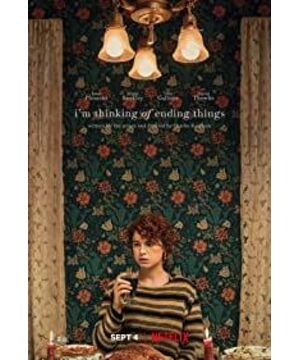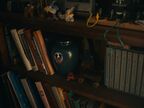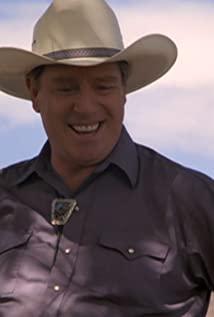There is only one really serious philosophical problem, and that is suicide. - Albert Camus, The Myth of Sisyphus
On September 4, 2020, the film of the same name was adapted from the 2016 debut novel of Canadian author Iain Reid (hereinafter referred to as the "author"), by Zeng Yin "Eternal Sunshine of the Spotless" ( Eternal Sunshine of the Spotless ) Mind ), the famous screenwriter and director Charlie Kaufman (hereinafter referred to as "director") who won the Oscar for Best Original Screenplay, wrote and directed "I'm Thinking of Ending Things" ( I'm Thinking of Ending Things ) Go online on Netflix.
The film tells the story of a young woman Lucy (Lucy) and her boyfriend Jake (Jake) driving back to their home on the farm to visit Jake's parents. Along the way, Lucy kept thinking about ending the relationship, but she never spoke to Jack. When she got to Jack's hometown, Lucy found that everything was weird: the dog who kept shaking his head, Jack's parents behaving strangely, the closed basement entrance. Even more bizarre, Lucy kept getting a call from her own number. After leaving Jack's parents' house, Jack suddenly decided to take Lucy to see his former high school on a snowy night road. There, everything will come to an end...
The story line
From the beginning of the trailer, the audience has been led into a misunderstanding: this may be a thriller story triggered by romance. The trivial and dense dialogue between Jack and Lucy makes it easy for the audience to ignore the interlude used in the film itself when watching it for the first time. The viewer is given a false spatial coherence from the very beginning of the highly deceptive cut mirror: Lucy stands on the side of the road and looks up at the window on the top floor, through which the old man looks down. Through the seemingly shared object of the window, the audience naturally forms the notion that "the old man and Lucy are in the same space and time".
Next, Lucy forms two parallel narrative lines with Jack and the old man. The couple chattered and talked constantly; the old man said nothing and made no sound. The two sides seem to be unrelated, but they are coherently advancing their own story progress. When a series of strange things happened at Jack's parents' house, the different atmospheres in the two storylines may finally make the audience wonder: "Is the old man really in the same time and space as Lucy?"
After that, Lucy and Jack set off on their way back, but suddenly switched to Jack's former middle school, and the story line of the old man and the couple began to approach. Finally, when the old man found Lucy alone in the school hallway, the audience's previous uncertainty was finally settled. On the occasion of parting with Lucy, the old man took out a pair of slippers that Jack had handed to Lucy at the farm home. From then on, his identity begins to overlap with Jack's, until it completely overlaps at the end of the film.
Ending with Old Jack's self-destruction, the two storylines in the film are like two trains heading towards the same destination. But are the two trains really unrelated until they finally meet?
The Romantic Imagination of Solitary Experiences
Looking back after watching the entire film, we may understand that the story line of the couple took place entirely in the imagination of old Jack. It can be seen from the dialogue between the couples that the old man is well educated and has a wide range of knowledge. In reality, he was reticent and lonely. He may be used to imagining a partner in his imagination every day, but since in reality, he has never traveled or dated with his partner, never lived a married life, and seldom even established a normal relationship with others, so he You can only choose to do the one thing you are most familiar with with your imaginary partner - go back to your parents' house.
Human imagination is always influenced by real experience. So the new swing next to the building he saw appeared in front of the broken building beside the road in his imagination. So the musical rehearsal he heard while cleaning the school theater became an imaginary clip of Oklahoma on the radio. So the actress he saw on the TV show at lunchtime became part of his imaginary girlfriend. So the girl he met in the hallway who made fun of his walking posture became the imaginary waiter in an ice cream shop wearing heavy makeup and ignoring the order. Only the girl who was alone in the hallway, the girl who was rejected by her classmates but gave old Jack a shy smile, became the only service in the ice cream shop that would take care of Lucy.
Old Jack was indeed a loner, but it wasn't a ludicrous utopia that he made up in his head every day. He consolidates the knowledge he has mastered in his imagination, weakens the malice of others, and magnifies the goodwill of others. He loves his parents, but because of different education levels and interests, he cannot have a satisfying conversation with them. Therefore, in his imagination, he showed not only his impatience with his parents, but also his obsession with his elderly parents.
It can be said that the old Jack's family memories, what he has learned, and his observations and feelings about the whole world are all concentrated in his imagination. What the audience sees in the film is only the imaginary world of the last day of his life. But every day before that, he was creating a world that was completely different in detail after another.
Through this story line that did not exist in the original novel, the director vividly expresses a view that the experience of loneliness is not nothingness or blankness. Conversely, loneliness may be an enrichment in another dimension, but it cannot be expressed outwardly and can only be a one-sided experience.
last question
There is only one problem to solve now. I am afraid. I feel a little crazy. My mind is not very clear. Those assumptions are correct. I can feel my fear growing. Now is the time to seek answers. Just that one question. A problem needs to be solved.
This is a phrase that recurs in both the novel and the film. This passage is mostly heard by Lucy while answering the phone, and in the end readers and viewers may realize that it is the inner monologue of old Jack.
For a lonely person, for a person who finally decides to take his own life, what is this problem that needs to be solved? Is it "Should I end this"? Or "why don't I have a lover/friend"? We have no way of knowing. But what we do know is that for old Jack, this question must be the last question of his life, and the ultimate question of his life.
Of course, this recurring phrase isn't that problem, because "last" doesn't repeat, "last" has one and only one. The repetition of this passage is actually a struggle of old Jack. He is not willing to face this problem, he is not willing to go to the "final". So that ice cream parlour waiter would say "you don't go any further" to Lucy, and that's old Jack using his imagined magnified kindness of others to try and prevent himself from making the final decision.
Sometimes an idea is closer to the truth, closer to reality than an action. You can say whatever you want, you can do whatever you want, but you can't lie about your ideas.
This is another quote that comes up repeatedly in novels and movies. This sentence is more like the core explanation of the whole story. At the beginning of the story, Lucy has already said the most real thoughts for old Jack: I want to end it all. It's just that at the time, no one knew what it meant, and no one knew what "I" wanted to end.
Old Jack restrained his actions and words as much as possible, so he needed this sentence to explain himself. But even though actions and words deplete the authenticity of understanding, it is impossible for humans to understand each other through something other than the two.
At the dinner table, Lucy mentions the first encounter with Jack at the bar and that Jack asked her for her phone number. That should be something Jack has never done in reality. This also explains why, in Old Jack's imagination, the protagonist of the narrative is not himself. Because he knows all his thoughts too well for him to believe he can do those things. He can only withdraw from imagining his own story and become a mere spectator, or a voyeur (as it is discovered at the end).
But even with a fictional alter ego, Jack (whether old or imaginary) cannot deceive himself. When the real someone else appeared in the imagination - the ice cream shop waiter - Jack, who was hesitant to talk and dodge wildly, reappeared.
Such a person who thinks his thoughts are closer to the truth, such a taciturn and uncommunicative person, has worked for thirty years in a middle school where people come and go every day. As a colleague in the novel said, it is indeed a very absurd thing:
If he wants to be alone, why do a job surrounded by people? Isn't that some sort of self-torture?
Maybe the reality is full of all kinds of contradictions. For example, redemption is often hidden in pain. Old Jack may have been looking forward to an encounter, a conversation. An encounter like that in the bar, or the one with Lucy at the end of the film. A conversation that has been missed for decades and can only be repeated in the imagination, or the conversation with Lucy at the end of the film.
In the end, he didn't wait for anyone. Only the phantoms in his own imagination came.
A world that can even be explained by evil is a kind world. But instead, in a world suddenly deprived of fantasy and light, one feels like an outsider. This exile is irreparable, as the nostalgia for the lost homeland and the hope for a heavenly paradise are stripped away. (The Myth of Sisyphus)
As Camus describes it, old Jack grew tired of nostalgia for his family and gave up expectations of an ideal relationship. He chose complete self-imposed exile in spirit and flesh.
He recalled a passage from the Bible that he heard on the morning radio. It was Isaiah chapter 1 verse 18: "Though your sins be as scarlet, they will become white."
He walked into the vast snow. He is grateful for all the passers-by in his life. He expressed his envy and incomprehension of love. He sang a lonely song aloud.
This is a story about loneliness and imagination, it may make us think about how relationships are built, developed and continued, it may also make us pay more attention to the inner world of others, and it may even make some people change their introversion behavior pattern. Of course, we're more likely to ask hundreds of questions about this story, along with a wide variety of answers.
And we, still don't know what the last question is.
View more about I'm Thinking of Ending Things reviews











